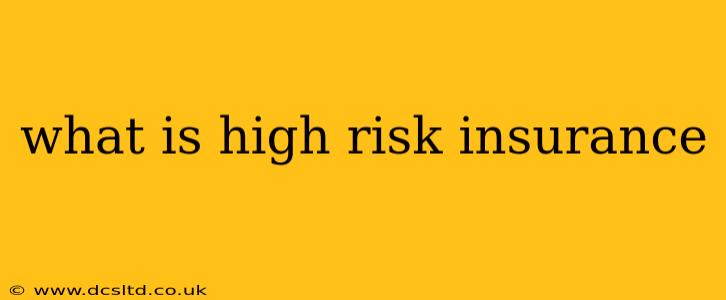High-risk insurance refers to insurance policies designed for individuals or businesses considered higher than average risks. This means insurance companies perceive a greater likelihood of a claim being filed compared to the average applicant. These policies often come with higher premiums than standard policies due to the increased potential for payouts. But what constitutes "high-risk"? Let's delve into the specifics.
What Makes Someone or Something a High-Risk Insurance Applicant?
The definition of "high-risk" varies considerably depending on the type of insurance. Several factors contribute to a high-risk designation:
-
Driving History: For auto insurance, a history of accidents, speeding tickets, DUIs, or reckless driving significantly increases risk. Individuals with multiple violations or a history of at-fault accidents will likely be considered high-risk.
-
Medical History: Health insurance companies assess pre-existing conditions, age, and lifestyle factors. Individuals with chronic illnesses, a history of major health issues, or engaging in risky behaviors (e.g., smoking) might face higher premiums or even be denied coverage altogether in some cases.
-
Property Location: Home insurance considers the location of the property. Homes in high-crime areas, flood zones, or areas prone to wildfires are deemed higher risk and attract higher premiums. The condition of the property itself also factors in; older homes with inadequate safety measures might face higher premiums.
-
Business Operations: For business insurance, factors like the industry, size of the operation, safety records, and claims history all determine risk. Businesses in inherently risky industries (e.g., construction, manufacturing) are typically considered higher risk.
What Types of Insurance Are Often Considered High-Risk?
High-risk designations aren't limited to a single insurance type. Several common insurance categories often involve high-risk classifications:
-
Auto Insurance: This is perhaps the most common area where high-risk designations occur, due to the aforementioned driving history factors.
-
Homeowners Insurance: Location, property condition, and past claims significantly influence the risk assessment.
-
Health Insurance: Pre-existing conditions, age, and lifestyle choices play a large role in determining premiums and eligibility.
-
Life Insurance: Factors such as age, health, occupation, and lifestyle can impact premiums. Individuals in high-risk professions (e.g., firefighters, police officers) might face higher premiums.
-
Business Insurance: The specific business activities, safety measures, and past claims all play a role in determining the level of risk.
How to Find High-Risk Insurance?
Finding insurance when you're considered high-risk can be challenging but not impossible. Here are some strategies:
-
Specialized Insurers: Many insurers specialize in covering high-risk individuals or businesses. Researching these companies is key.
-
Comparison Shopping: Using online comparison tools can help you find the best rates from various insurers. Be upfront about your risk factors.
-
Improving Your Risk Profile: If possible, take steps to reduce your risk profile. For example, completing a defensive driving course can lower your auto insurance premiums.
What are the Costs of High-Risk Insurance?
Expect significantly higher premiums compared to standard coverage. The exact increase depends on the specific factors contributing to the high-risk designation and the insurer. It's crucial to weigh the cost against the potential financial consequences of being uninsured.
Is High-Risk Insurance Worth It?
While the cost is higher, high-risk insurance provides crucial protection against unexpected events. The financial implications of being uninsured in the event of an accident, illness, or property damage can be devastating. Weighing the cost of the policy against the potential cost of an uninsured event is critical.
This overview provides a general understanding of high-risk insurance. The specifics always depend on individual circumstances and the type of insurance required. Consulting with an insurance broker can provide personalized guidance and help you navigate the complexities of obtaining the necessary coverage.
